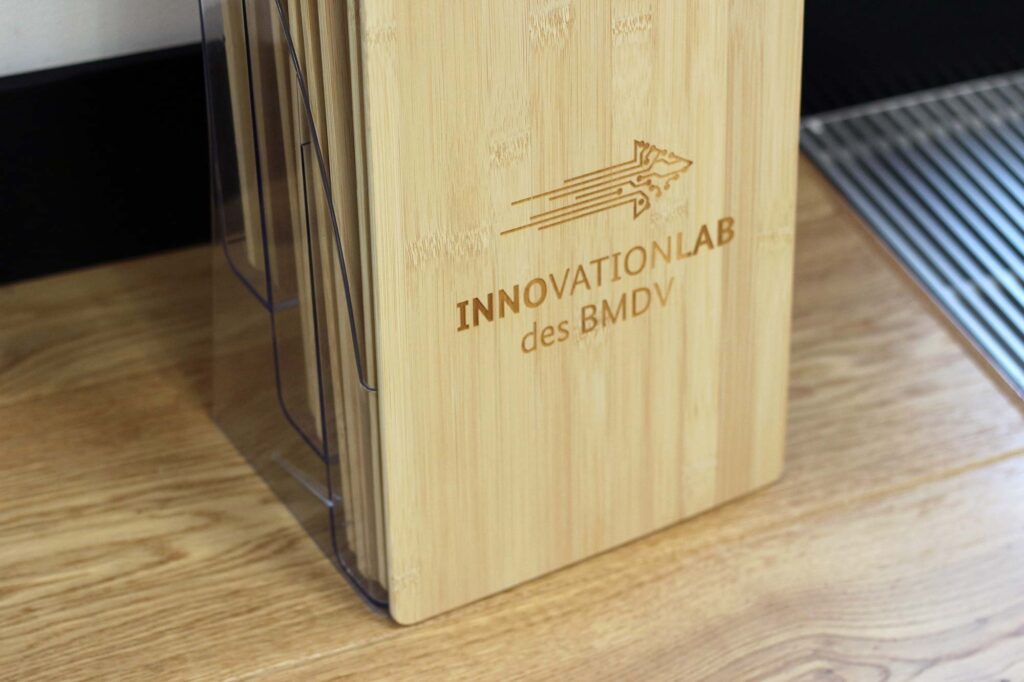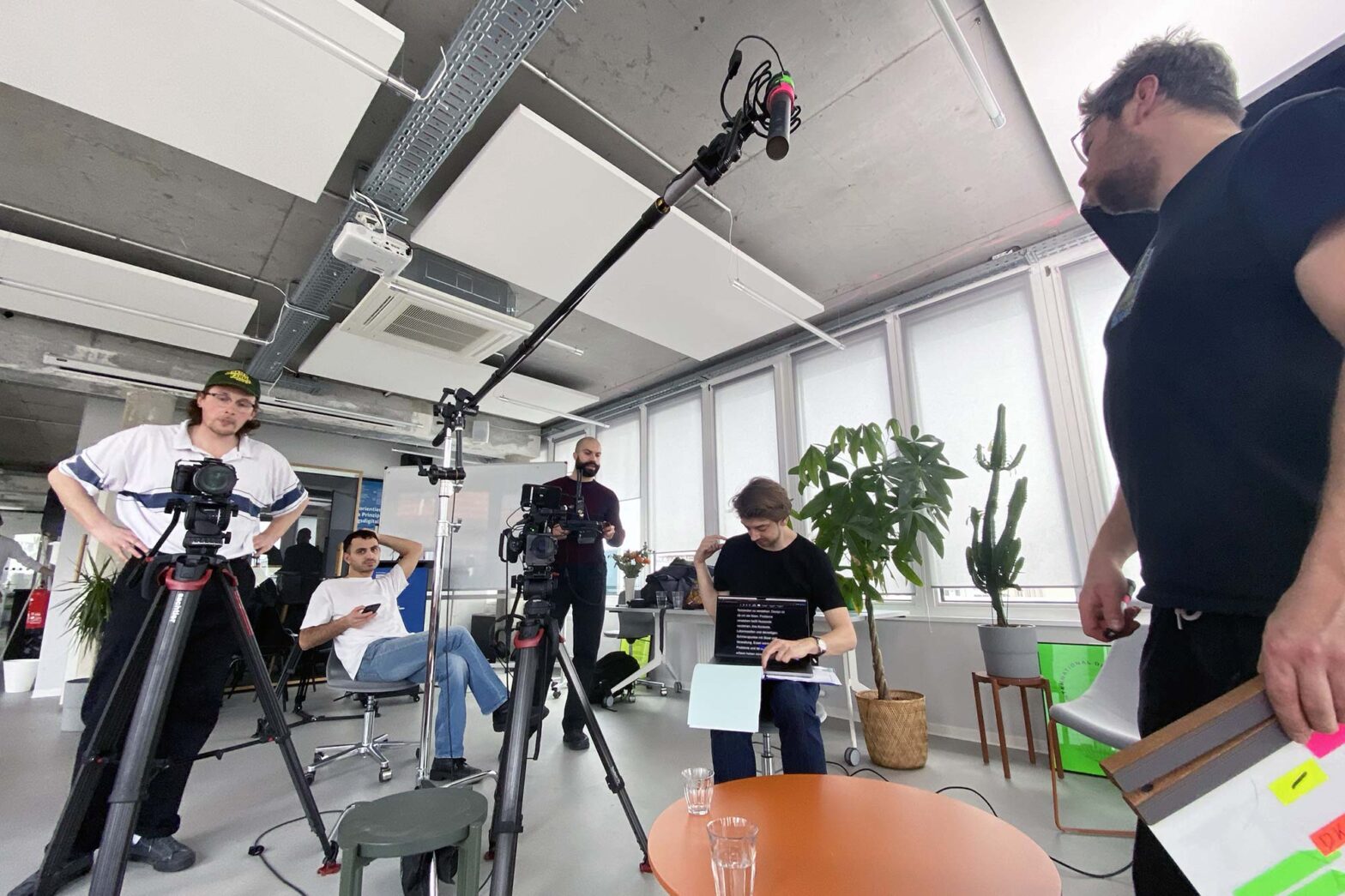I spent Thursday afternoon in front of some cameras. In the past few weeks, my colleagues Lutz and Roshan planned to produce two short videos, and I was part of both.
Explaining what we do and how we do it cannot happen only through 1,000+ word blog posts and the occasional social media post. Especially for recruitment, we need shorter and more accessible formats to communicate. Video is, of course, great for it.
At GDS, I helped create videos, like the one on ‘Becoming a service designer at GDS’. However, I – literally – remained in the blurry background because others from my team did an excellent job. For example, Clara and Kara offered a brilliant ‘Welcome to the UK government design community’. This time, there was no escape, and I was asked not to hide.
In one of the videos, I explain what designers and user researchers do in about 45 seconds. In the second film, my colleague Stephanie, our Chief Product Officer, and I discuss our approach at Digital Service – why we work in a user-centred, iterative, and evidence-based way and what that means in practical terms.
I’m curious what the result will look like. With more event contributions planned for the year, the material should become handy quickly.
Talking to further ministries about user-centred ways of doing
On Tuesday, I attended an offsite of a ministry’s digital unit that I had not been in touch with before. For 2 days, about 70 people got together to share work and co-develop their strategy. I joined for only an hour as a guest presenter. I remixed various previous talks, shared examples of our work and covered the Digital Check for digital-ready legislation and the Service Standard. My sober title roughly translates as ‘New thinking and doing in digital projects’.
Quoting a section of the 2021 coalition agreement, I asked how much they have seen a substantial shift towards “agile and digital government [that follows] interdisciplinary and creative problem solving [from] a user’s perspective” in the past two and a bit years. The attendees laughed and shook their heads. Later, I asked who was familiar with the Digital Check and the Service Standard. Only one person had heard of the latter, and about a quarter to a third had heard of the Digital Check, which makes sense in a policy-oriented ministry.
With the essential work they are doing, I would be delighted to cross paths with them again. I also referenced some related UK work that hopefully has sparked their interest. I also left them posters of the Digital Check and Service Standard to put up in their offices.
I have a further invitation to another ministry’s innovation lab. They run a digital morning lecture format and reached out to get me to talk about our work with user-centred approaches.
In the meantime, I attended another working session on the Federal government’s digital strategy on Friday. With the work in the learning clusters progressing, more official communication seems to be coming. We gathered in the newly opened innovation lab of the Federal Ministry for Digital and Transport, a hidden top-floor, back-building space that’s nicely furnished.

Balancing the work inside our organisation and across the public sector, I enjoy the exposure and exchange with people from other parts of the German public sector. Every talk and each exchange feels like a drop in the ocean. Still, they matter and, hopefully, can lead to more considerable change.
On Tuesday evening, I followed a remote ‘UX Chat’ organised by German UPA, the national chapter of the ‘Usability Professionals Association’. My colleague Sonja spoke about enabling organisations to embrace user research. She did a fabulous job explaining what she does at Digital Service, how it differs from the organisations in the private sector she has worked for, and how to create tangible value for nearby stakeholders quickly.
Finding the updated digital transformation act blocked in Parliament
It was a surprise on Friday. The Bundesrat, the upper part of the German parliament, rejected the updated Online Access Act that had been agreed on in the Bundesrat, the lower house, about 4 weeks ago. The Federal states suddenly did not agree with significant parts of it. They also had questions about financing newly regulated tasks from their state-level budgets.
The updated act was supposed to strengthen the adoption of the central account BundID, push for true end-to-end digitalisation by going into the backends of services, and bring more standardisation to the digital transformation efforts. It was also supposed to push open source and the once-only principle and improve registers. Somewhat vaguely, it also referenced an enforceable user right to access administrative services digitally from 2028.
None of this is happening now or in the next few weeks. The draft law goes back to a parliamentary mediation committee. States and their municipalities argue they require more money to implement the law at their levels. And they want to have a say regarding standards instead of seeing them developed and then imposed by the Federal government in a solitary fashion. The updated Online Access Act will be vital in increasing everyone’s ambitions – as imperfect as the law might be.
What’s next
It’s going to be another short week as the Easter weekend is approaching.
I will co-deliver another ‘Introduction to Accessibility’, which I haven’t done in a few months as more members of the accessibility ambassador group have been taking on the responsibility. I also plan on preparing a new welcome experience for our 4 new starters, who are joining in April. Furthermore, I will be interviewing more candidates for our open regular-level roles. By now, we have received 200 applications.

